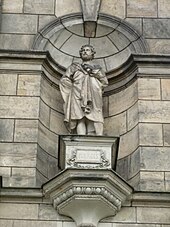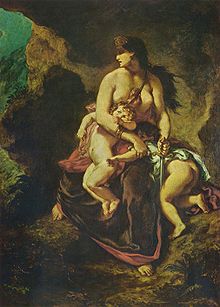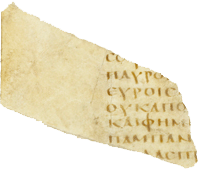Euripides
More of his plays have survived intact than those of Aeschylus and Sophocles together, partly because his popularity grew as theirs declined[4][5]—he became, in the Hellenistic Age, a cornerstone of ancient literary education, along with Homer, Demosthenes, and Menander.
[6] Euripides is identified with theatrical innovations that have profoundly influenced drama down to modern times, especially in the representation of traditional, mythical heroes as ordinary people in extraordinary circumstances.
Traditional accounts of the author's life are found in many commentaries, and include details such as these: He was born on Salamis Island around 480 BC, with parents Cleito (mother) and Mnesarchus (father), a retailer from the deme of Phlya.
It is said that he died in Macedonia after being attacked by the Molossian hounds of King Archelaus, and that his cenotaph near Piraeus was struck by lightning—signs of his unique powers, whether for good or ill (according to one modern scholar, his death might have been caused instead by the harsh Macedonian winter).
[clarification needed][17] In an account by Plutarch, the catastrophic failure of the Sicilian expedition led Athenians to trade renditions of Euripides' lyrics to their enemies in return for food and drink (Life of Nicias 29).
ὑπολεπτολόγος, γνωμιδιώτης, εὐριπιδαριστοφανίζων a quibbler of words, a maker of maxims, a Euripidaristophaniser According to another comic poet, Teleclides, the plays of Euripides were co-authored by the philosopher Socrates:[21] Μνησίλοχός ἐστ᾿ ἐκεῖνος, <ὃς> φρύγει τι δρᾶμα καινόν Εὐριπίδῃ, καὶ Σωκράτης τὰ φρύγαν᾿ ὑποτίθησιν.
τὸ δ᾿ ἐπὶ σεμνοῖσιν λόγοισι καὶ σκαριφησμοῖσι λήρων διατριβὴν ἀργὸν ποιεῖσθαι, παραφρονοῦντος ἀνδρός So what's stylish is not to sit beside Socrates and chatter, casting the arts aside and ignoring the best of the tragedian’s craft.
To hang around killing time in pretentious conversation and hairsplitting twaddle is the mark of a man who's lost his mind In The Frogs, written when Euripides and Aeschylus were dead, Aristophanes has the god Dionysus venturing down to Hades in search of a good poet to bring back to Athens.
[29] In the Bacchae, he restores the chorus and messenger speech to their traditional role in the tragic plot, and the play appears to be the culmination of a regressive or archaizing tendency in his later works (for which see Chronology below).
Believed to have been composed in the wilds of Macedonia, Bacchae also dramatizes a primitive side to Greek religion, and some modern scholars have interpreted this particular play biographically, therefore, as: One of his earliest extant plays, Medea, includes a speech that he seems to have written in defence of himself as an intellectual ahead of his time (spoken by Medea):[11] σκαιοῖσι μὲν γὰρ καινὰ προσφέρων σοφὰδόξεις ἀχρεῖος κοὐ σοφὸς πεφυκέναι·τῶν δ᾿ αὖ δοκούντων εἰδέναι τι ποικίλονκρείσσων νομισθεὶς ἐν πόλει λυπρὸς φανῇ.ἐγὼ δὲ καὐτὴ τῆσδε κοινωνῶ τύχης [298–302].
With the introduction of the third actor (attributed to Aeschylus by Themistius; to Sophocles by Aristotle),[33] acting also began to be regarded as a skill worth prizes, requiring a long apprenticeship in the chorus.
[citation needed] Euripides and other playwrights accordingly composed more and more arias for accomplished actors to sing, and this tendency became more marked in his later plays:[34] tragedy was a "living and ever-changing genre"[35] (cf.
[36] In general, he was interested in the "issues related to the constitutive polarities of Athenian ideology",[37][38] that is to say, the oppositions between women and men, slaves and free people, foreigners and Greeks, among others.
But fifth-century tragedy was a social gathering for "carrying out quite publicly the maintenance and development of mental infrastructure", and it offered spectators a "platform for an utterly unique form of institutionalized discussion".
[47] Traditional myth provided the subject matter, but the dramatist was meant to be innovative, which led to novel characterizations of heroic figures[48] and use of the mythical past as a tool for discussing present issues.
[51] For example, in Hippolytus, a love-sick queen rationalizes her position and, reflecting on adultery, arrives at this comment on intrinsic merit: ἐκ δὲ γενναίων δόμωντόδ᾿ ἦρξε θηλείαισι γίγνεσθαι κακόν·ὅταν γὰρ αἰσχρὰ τοῖσιν ἐσθλοῖσιν δοκῇ,ἦ κάρτα δόξει τοῖς κακοῖς γ᾿ εἶναι καλά.
For example, in The Trojan Women, the heroine's rationalized prayer elicits comment from Menelaus: ΕΚΑΒΗ: [...] Ζεύς, εἴτ᾿ ἀνάγκη φύσεος εἴτε νοῦς βροτῶν,προσηυξάμην σε· πάντα γὰρ δι᾿ ἀψόφουβαίνων κελεύθου κατὰ δίκην τὰ θνήτ᾿ ἄγεις.ΜΕΝΕΛΑΟΣ: τί δ᾿ ἔστιν; εὐχὰς ὡς ἐκαίνισας θεῶν [886–889].
For others, psychological inconsistency is not a stumbling block to good drama: "Euripides is in pursuit of a larger insight: he aims to set forth the two modes, emotional and rational, with which human beings confront their own mortality.
[65] Sometimes condemned by critics as an unimaginative way to end a story, the spectacle of a "god" making a judgement or announcement from a theatrical crane might actually have been intended to provoke scepticism about the religious and heroic dimension of his plays.
[69] Traditional myth with its exotic settings, heroic adventures, and epic battles offered potential for romantic melodrama as well as for political comments on a war theme,[70] so that his plays are an extraordinary mix of elements.
[citation needed] The Trojan Women, for example, is a powerfully disturbing play on the theme of war's horrors, apparently critical of Athenian imperialism (it was composed in the aftermath of the Melian massacre and during the preparations for the Sicilian Expedition),[71] yet it features the comic exchange between Menelaus and Hecuba quoted above, and the chorus considers Athens, the "blessed land of Theus", to be a desirable refuge—such complexity and ambiguity are typical both of his "patriotic" and "anti-war" plays.
He wrote plays which have been widely understood as patriotic pieces supporting Athens' war against Sparta and others which many have taken as the work of the anti-war dramatist par excellence, even as attacks on Athenian imperialism.
But a first place might not have been the main criterion for success (the system of selecting judges appears to have been flawed),[citation needed] and merely being chosen to compete was a mark of distinction.
[85] According to Plutarch, Euripides had been very well received in Sicily, to the extent that after the failure of the Sicilian Expedition, many Athenian captives were released, simply for being able to teach their captors whatever fragments they could remember of his work.
[90] August Wilhelm's Vienna lectures[citation needed] on dramatic art and literature went through four editions between 1809 and 1846; and, in them, he opined that Euripides "not only destroyed the external order of tragedy but missed its entire meaning".
It was about then that Aristophanes of Byzantium compiled an edition of all the extant plays of Euripides, collated from pre-Alexandrian texts, furnished with introductions and accompanied by a commentary that was "published" separately.
This became the "standard edition" for the future, and it featured some of the literary conventions that modern readers expect: there was still no spacing between words; little or no punctuation; and no stage directions; but abbreviated names denoted changes of speaker; lyrics were broken into "cola" and "strophai", or lines and stanzas; and a system of accentuation was introduced.
Some of this work employed infrared technology—previously used for satellite imaging—to detect previously unknown material by Euripides, in fragments of the Oxyrhynchus papyri, a collection of ancient manuscripts held by the university.
Thus, for example, two extant plays, The Phoenician Women and Iphigenia in Aulis, are significantly corrupted by interpolations[106] (the latter possibly being completed post mortem by the poet's son); and the very authorship of Rhesus is a matter of dispute.
A two-volume selection from the fragments, with facing-page translation, introductions, and notes, was published by Collard, Cropp, Lee, and Gibert;[123][124] as were two Loeb Classical Library volumes derived from them;[125][126] and there are critical studies in T. B. L. Webster's older The Tragedies of Euripides,[127] based on what were then believed to be the most likely reconstructions of the plays.





